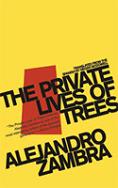 tr. Megan McDowell
tr. Megan McDowell
[Open Letter; 2010]
by Max Rivlin-Nadler
The Private Lives of Trees, a fleeting novel that chronicles a single, uneventful night with an improvised Chilean family, operates on a simple rule: the novel will end when Verónica, the young matriarch, returns from her drawing class. As long as she is absent, the novel will continue. Julián, recently married to Verónica, spends his evening considering his wife’s whereabouts, and narrating a story to his step-daughter, Daniela. We are told, if Julián realizes that Verónica is never returning, the novel will also end.
Julián’s ruefulness contends with the established rules of the novel, just as Zambra toys with the idea of fidelity to his own parameters. Julián, a fiction writer, is a somber stand-in for Zambra who finds his mind wandering from the urgency of his wife’s absence. The story he tells his step-daughter, concerning the inner thoughts of two trees, is secondary to his own projections for the dissolution of his family. “Life is a chaos that seems to be resolved,” he thinks, and resigns himself to a dismal recollection of the past, and a future for Daniela that resembles his own meager aspirations. He claims not to remember much of his childhood and can only impose an uninteresting future on his sleeping ward.
For all his melancholy, Julián is a fragile and brilliant creation, one whose own laws for living mirror the strictures of the novel. He believes that “one loves in order to stop loving, and one stops loving in order to start loving others, or to end up alone, for a while or forever.” As the link between Julián and Daniela dissolves alongside the slow realization of Verónica’s flight, Zambra acknowledges that there is a freedom to be found in being unprepared. Julián takes Daniela, no longer the daughter of his wife, to school in the morning. There is no plan—he’s alone again. The novel ends.
This post may contain affiliate links.






